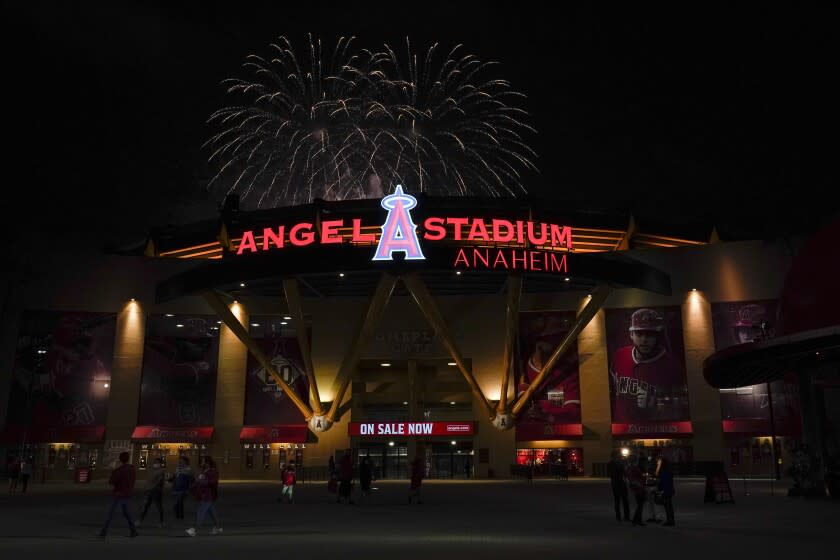Attorneys: Angel Stadium land sale should stand even if Anaheim violated a state law

The Angel Stadium land sale should not be nullified even if the city of Anaheim violated a state law in negotiating the deal, attorneys representing a management company controlled by Angels owner Arte Moreno argued in a court filing Thursday night.
The city asserted again Thursday that it did not violate a state law that generally requires public business be done in public meetings, not behind closed doors. However, the position taken by Moreno’s company would allow for an Orange County Superior Court judge to preserve the deal even if the city is found in violation of the law. A trial is set for Feb. 14.
In its filing, the city focused on declarations submitted two weeks ago by City Councilman Jose Moreno and former City Manager Chris Zapata, who said the council decided to sell the property in a closed session two months before the city said it started formal negotiations. The city asked the court to throw out those declarations.
The city filing criticized Moreno and Zapata, alleging they had “brazenly violated” and “flagrantly disregarded” restrictions against disclosure of closed-session discussions. In a declaration Thursday, City Atty. Rob Fabela said the council had authorized him to say that Moreno and Zapata were “factually incorrect” because the discussion that night regarded a site appraisal and that a sale was not yet under negotiation.
The city also noted that, on the day the council approved the sale, Moreno said in a public meeting that Fabela had been “very good” at ensuring the law had been followed and said: “This is the first public discussion — the first discussion I should say — that the City Council has actually had on the actual deal points.”
In their filing, the attorneys for Moreno’s company said they agreed with the city that the law had not been broken. Even if it had, however, the attorneys cited two reasons why the judge should not throw out the deal.
First, the attorneys argued, the city conducted public hearings before the sale was finalized that included representatives of the citizens group suing to overturn the deal on grounds of insufficient public participation in the sale process.
Second, the attorneys cited a section of the law that says a deal should not be invalidated if a third party assumed a contractual obligation and acted “in good faith and without notice of a challenge to the validity of the action.”
The deal was approved by the City Council on Dec. 20, 2019. According to the filing, Moreno’s management company spent almost $200,000 on the project from that date through Jan. 19, 2020, when the citizens group warned the city of a possible lawsuit.
Under the deal, Moreno’s company would pay $150 million in cash for the 150-acre stadium site, with the city providing a $170-million credit toward the inclusion of parkland and affordable housing in a project that would surround the stadium with homes, hotels, shops, restaurants and offices.
The city also faces a Feb. 6 deadline to reach a resolution with the state housing agency, which has declared the stadium deal violates California affordable housing law but offered alternatives to settle the matter. The alternatives primarily involve the city putting the land up for bid, so as to assess any interest among affordable housing developers. The city also could accept a fine of about $96 million, either on its own or by asking Moreno’s company to share in that expense.
The City Council is scheduled to consider its response at its next meeting Tuesday.
This story originally appeared in Los Angeles Times.

 Yahoo Movies
Yahoo Movies 
